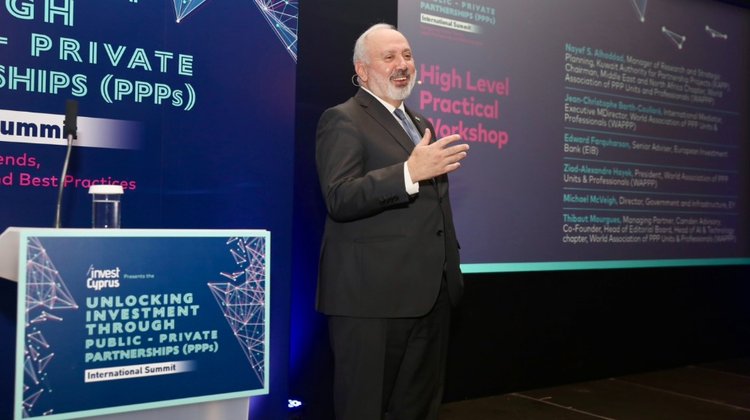Ziad-Alexandre Hayek reveals what typically causes PPPs to succeed or fail
12:11 - 27 March 2025

The President pf the World Association of PPP Units & Professionals (WAPPP) Ziad-Alexandre Hayek has revealed the elements that generally cause Public-Private Partnerships (PPPs) to either succeed of fail.
He was addressing a High Level Practical Workshop making up the second day of the 'Unlocking investment through Public-Private Partnerships (PPP)' International Summit in Nicosia.
Addressing the participants, Hayek revealed:
What causes a PPPs to fail:
- Poor policy
- Poor awareness by political decision makers
- Poor legislative and or/regulatory framework
- Poor project design and execution
- Poor planning
- Poor marketing to investors
- Poor communication with stakeholders
What causes a PPP to succeed:
- Approaching PPP as a tool for development
- Emphasising user-pays PPPs
- Providing for local, smaller PPPs
- Improving PPP awareness
- Clarifying the frameworks
- Prioritising and building a pipeline
- Analysing all project dimensions
- Reaching out to investors
- Involving stakeholders
He was also careful to point out, “We are here to learn from you as well. We can tell you what the best practices are but you are the ones who need to tell us what your needs are.”
He said that PPPs have existed since ancient times in one form or another, elaborating, “Most are ‘user pays’ type structures. You have a project, who is paying for it? Either the government or the people that use the road are paying for it. ‘User pays’ and concessions are two different forms of PPP, but they’re all PPP.”
Hayek also pointed out that the cost of capital for a private company is much higher than for the government. “And in a project where a private investor has to cover the equity cost, which is much higher than the real cost, then it becomes very costly. On the other hand, the government has access to much cheaper lending.”
This he went on to explain means that the government is able to unload some of the risks to the private sector, and “in return, the private sector will save with the government’s much lower borrowing rates.”
“There are many definitions out there,” Hayek said, “but the majority of us follow the world bank definition: PPP is a long term contract between a public party and a private party, for the development and/or management of a public asset or service, in which the private agent bears significant risk and management responsibility throughout the life of the contract, and remuneration is significantly linked to performance and/or the demand and use of the asset or service.”
“At WAPPP,” Hayek concluded, “We are firm believers in the value of PPP to society. Therefore we are very concerned about safeguarding our profession’s reputation and we advocate for what we call ‘Next Level PPPs’. ‘Next Level PPPs’ are PPPs that adhere to a set of international best practices and adopt the success factors listed above.“
The High Level Practical Workshop was designed to equip participants with the essential skills and strategies to develop compelling, investment-ready projects and effectively promote them to the right foreign direct investment (FDI) investors. Through expert insights, real-world case studies, and interactive sessions, attendees will learn how to structure projects to meet investor expectations, craft persuasive investment narratives, and utilise targeted promotion techniques to attract and engage the most suitable investors.
Speakers:
- Nayef S. Alhaddad, Manager of Research and Strategic Planning, Kuwait Authority for Partnership Projects (KAPP), Chairman, Middle East and North Africa Chapter, World Association of PPP Units and Professionals (WAPPP)
- Jean-Christophe Barth-Coullaré, International Mediator, Executive Director, World Association of PPP Units & Professionals (WAPPP)
- Edward Farquharson, Senior Adviser, European Investment Bank (EIB)
- Ziad-Alexandre Hayek, President, World Association of PPP Units & Professionals (WAPPP)
- Michael McVeigh, Director, Government and Infrastructure, EY
- Thibaut Mourgues, Managing Partner, Camden Advisory, Co-Founder, Head of Editorial Board, Head of AI & Technology chapter, World Association of PPP Units & Professionals (WAPPP)
- Ziad-Alexandre Hayek, President, World Association of PPP Units & Professionals (WAPPP)
- Lucia Fuselli, Chair of the Energy Chapter, Co-Chair of the Sustainability and Resilience Chapter, World Association of PPP Units & Professionals (WAPPP)
The Summit has been organised by Invest Cyprus, the World Association of Investment Promotion Agencies (WAIPA) and World Association of PPP Units & PPP Professionals (WAPPP).
EY Cyprus is Gold Sponsor, Hermes Airports is Silver Sponsor, and the European Investment Bank is the Knowledge Sponsor.

